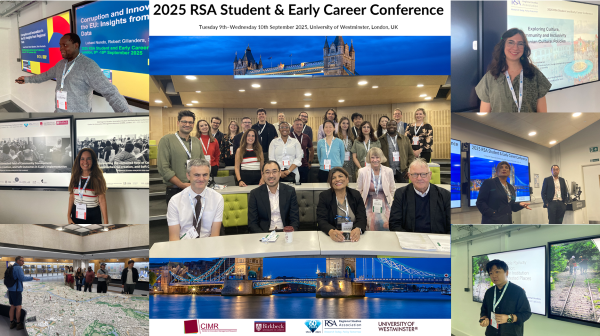This week, the University of Westminster Business School welcomed 30 participants: PhD students, early career researchers and speakers, to its central London campus for the 2025 RSA Student and Early Career Conference. The event, jointly organised with the Centre for Innovation Management Research (CIMR), University of Westminster and Brunel University, created a warm, supportive space for emerging scholars to share their ideas, refine their research, and connect with peers. The day began with the parallel paper sessions, where participants presented their latest research across various disciplines. These sessions were more than just presentations; they were conversations, with lively questions and thoughtful feedback.
In the afternoon, workshops covered essential topics such as getting published, securing research funding, understanding impact and pathways in academic careers. The speakers and workshops were practical, engaging, and inspiring.
The atmosphere was one of encouragement and empowerment, and participants left not only with new knowledge but also new networks, developed over the duration of the event. Over coffee breaks, lunch, and chats during the East London tour, participants built friendships and professional networks that will last far beyond the event.

On the second day, the conference moved beyond the classroom with a guided tour of East London, allowing participants to see research, policy, and history in action. The group began at the London Centre, where they explored the impressive scale model of the city and reflected on the challenges and opportunities of urban growth. From there, they wandered through Spitalfields, learning how successive waves of migration have shaped the neighbourhood’s identity and culture. The tour ended in Stratford, where regeneration projects around the Olympic Park offered a tangible look at how innovation, policy, and investment reshape communities.
Navigating all this was made slightly more adventurous by the London Underground strikes taking place at the time, which added a real-world reminder of the city’s complexity and the resilience of its transport systems (and its researchers!).
There was a strong sense of community by the end of the two days. Delegates left knowing they were part of a wider network of peers and mentors committed to supporting each other as they move forward in academia and beyond.
Read a recent blog post by Helen Lawton Smith and Thanos Fragkandreas on LinkedIn.